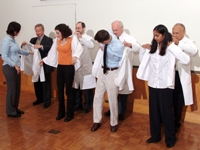
What to wear on the first day of school? Members of the Class of 2009 try their new white coats on for size.
As they donned their white coats on August 24, the Class of 2009 at Weill Cornell Medical College officially assumed the mantle of the medical student.
One hundred and one students were helped into their white coats by the deans and professors who participated in the ceremony: Drs. Antonio Gotto, dean of the Medical College; Bruce Ballard, associate dean for student affairs and equal opportunity programs and associate professor of clinical psychiatry; Carol Storey-Johnson, senior associate dean for education and associate professor of clinical medicine; Richard Cohen, clinical professor of medicine; Jessica Davis, associate professor of clinical pediatrics; Lewis Drusin, professor of clinical public health and professor of clinical medicine; Oliver Fein, associate dean for affiliations, professor of clinical medicine and professor of clinical public health; Debra Gillers, associate dean for academic affairs; Thomas Maack, professor of physiology and biophysics and physiology in medicine; Peter Marzuk, associate dean for curricular affairs and associate professor of psychiatry; Shari Midoneck, associate professor of clinical medicine; Paul Miskovitz, clinical professor of medicine; Thomas Sculco, professor of orthopedic surgery and chair of the Department of Orthopedic Surgery; and David Silbersweig, associate professor of psychiatry and associate professor of neurology.
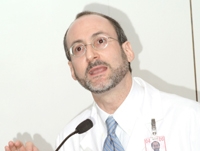
Dr. David Silbersweig delivers the keynote address, urging students to find and even forge their own path.
Dr. Ballard welcomed the audience to the ninth annual ceremony. "These coats are a symbol of medicine," he said. "When you wear them, others will expect a certain level of knowledge, expertise, care and compassion."
Dr. Ballard emphasized the Medical College's total integration of basic science and clinical skill; the students meet with patients from the start to begin to cultivate a "bedside" manner. "Tomorrow, you will wear the very white coats you don today," he said.
Dr. Silbersweig delivered the keynote address, a meditation on the limitless horizons of modern medicine. Dr. Silbersweig grew up surrounded by doctors — including his father, grandfathers and uncles — and for a while he resisted the family tradition for studies in philosophy. But philosophy was the path that brought him back to medicine, raising fundamental questions of the mind that Dr. Silbersweig would seek to understand through neuroscience. He found himself "at the intersection of psychiatry and neurology," he said. Twenty-three years ago, he moved into Olin Hall, the Medical College dormitory. "Your time at Weill Cornell will shape you and always be with you," he said. "The white coat is a tremendous accomplishment, and also a responsibility. It can be traced to priestly healing traditions; at other times, it's a uniform, reflecting our occupation."
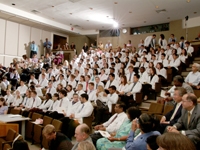
Faculty, friends and family pack Uris Auditorium to welcome the Class of 2009.
"We grow into our white coats," he added. "At first, you may feel like an imposter. But the coat is transformative. There's a sacred trust associated with the white coat. As you take on the mantle of becoming a physician, you see patients at their most vulnerable and tragic points. They will reveal the most private aspects of their lives to you. One gains unique insight into human nature, and we can use that insight to help our patients through the most difficult times of their lives."
Dr. Silbersweig argued that now more than ever, patients need physicians to guide them through the explosions of knowledge. As medicine changes at a blistering pace, he said, the white coat reminds the doctor of the immutable core values: compassion, attentiveness and empathy. "Listen to your patients; give them your undivided attention, even when you're harried," he said. "We should endeavor to show to others the same respect the white coat engenders."
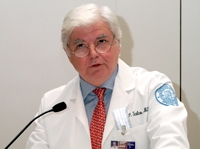
Dr. Thomas Sculco challenges the new students to "push the envelope" in making the medical profession better.
He urged the students to find and even forge their own path, at a time when new fields of medicine are crystallizing day by day.
"If you stick close to what you're passionate about, and find your niche, you can help to create a whole new field, and you'll do the best by your patients. It's a thrilling adventure you're about to embark upon."
Dean Gotto warmly welcomed the students, deeming the group "a highly accomplished and select class, with the promise of making contributions to medicine and society."
"You come from extremely diverse backgrounds, interests, accomplishments and talents," he said. The students represent 52 undergraduate colleges — with Cornell, Harvard and Yale the most common three — and hold degrees in 43 subjects. They come from 24 different states and were born in 16 different countries. Fifty-one are women. The average age is 24.3. Members have netted an impressive amount of international experience, with time spent working or volunteering in Croatia, Denmark, Greece, the UK and Senegal. It's a highly musical class — with enough percussionists, pianists, guitarists, flutists and others to perform a symphony! One student founded his own record label. There are congressional interns, EMT volunteers and computer analysts.
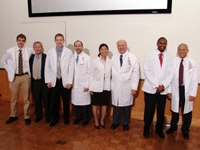
A new generation stands eager and proud with Dean Gotto, Dr. Silbersweig, Dr. Peter Marzuk and Dr. Bruce Ballard.
The White Coat Ceremony segued directly into the Opening Exercises, where Dr. Sculco reminisced about his first days as a medical student 40 years ago, at the Columbia University College of Physicians and Surgeons. "You should feel a great sense of accomplishment in being here," he said. "You will join a profession like no other."
"Medical school begins a lifelong process of education, a commitment to lifelong learning," Dr. Sculco said. He reminded the students to seek insight and enlightenment from not only professors, but also patients. "Patients can teach the physician so much. Listen to your patients! Beyond the simple diagnoses you will make, you will learn how their illness affects their lives and livelihood."
"Read, question, examine, listen, study, probe and seek out knowledge. Push the envelope to make our profession better. Your interests and passions will make you a better doctor."
Finally, he counseled: "Take advantage of all New York City has to offer. It will never cease to amaze you."
Photos by Weill Cornell Art & Photo.

